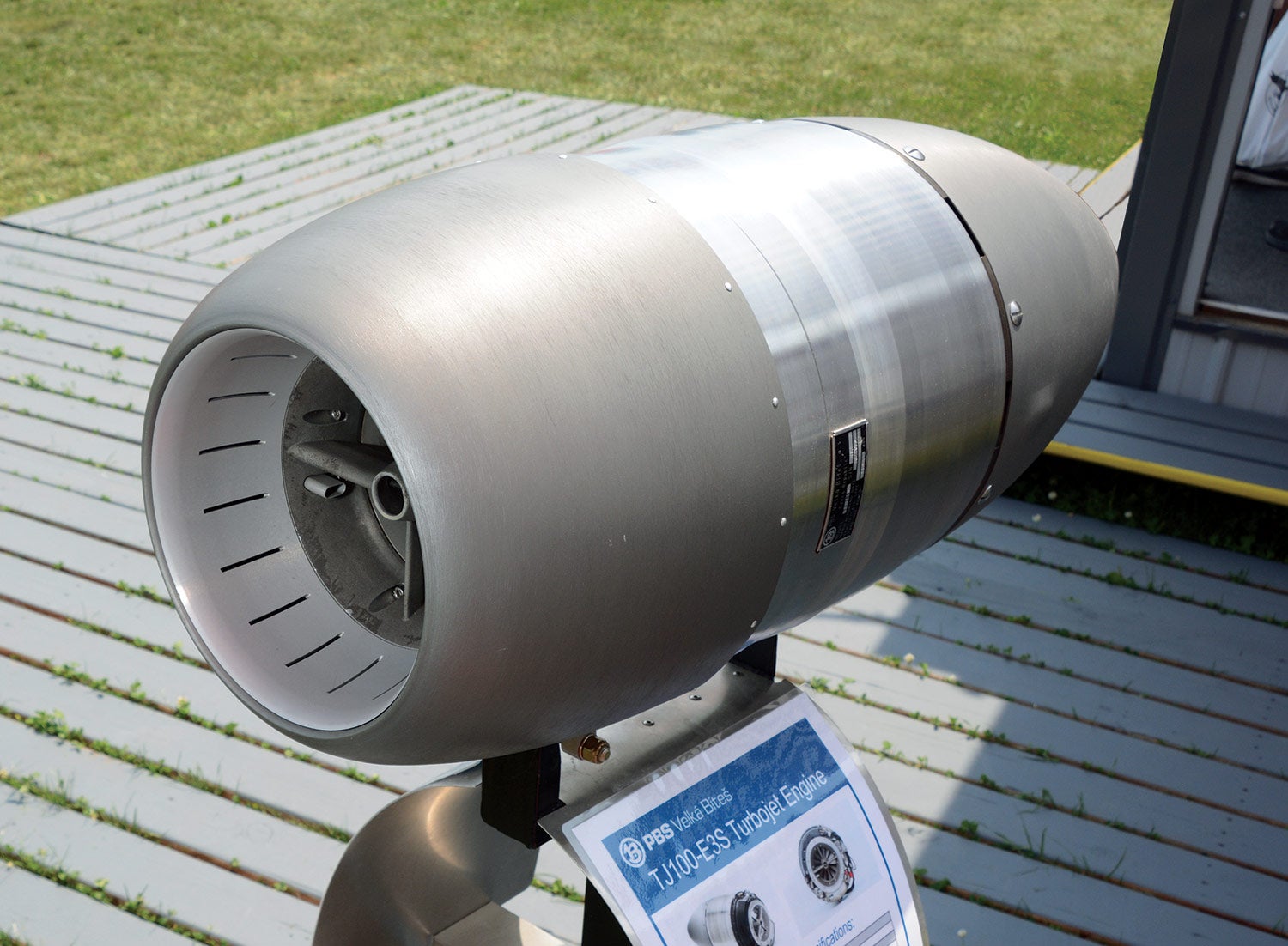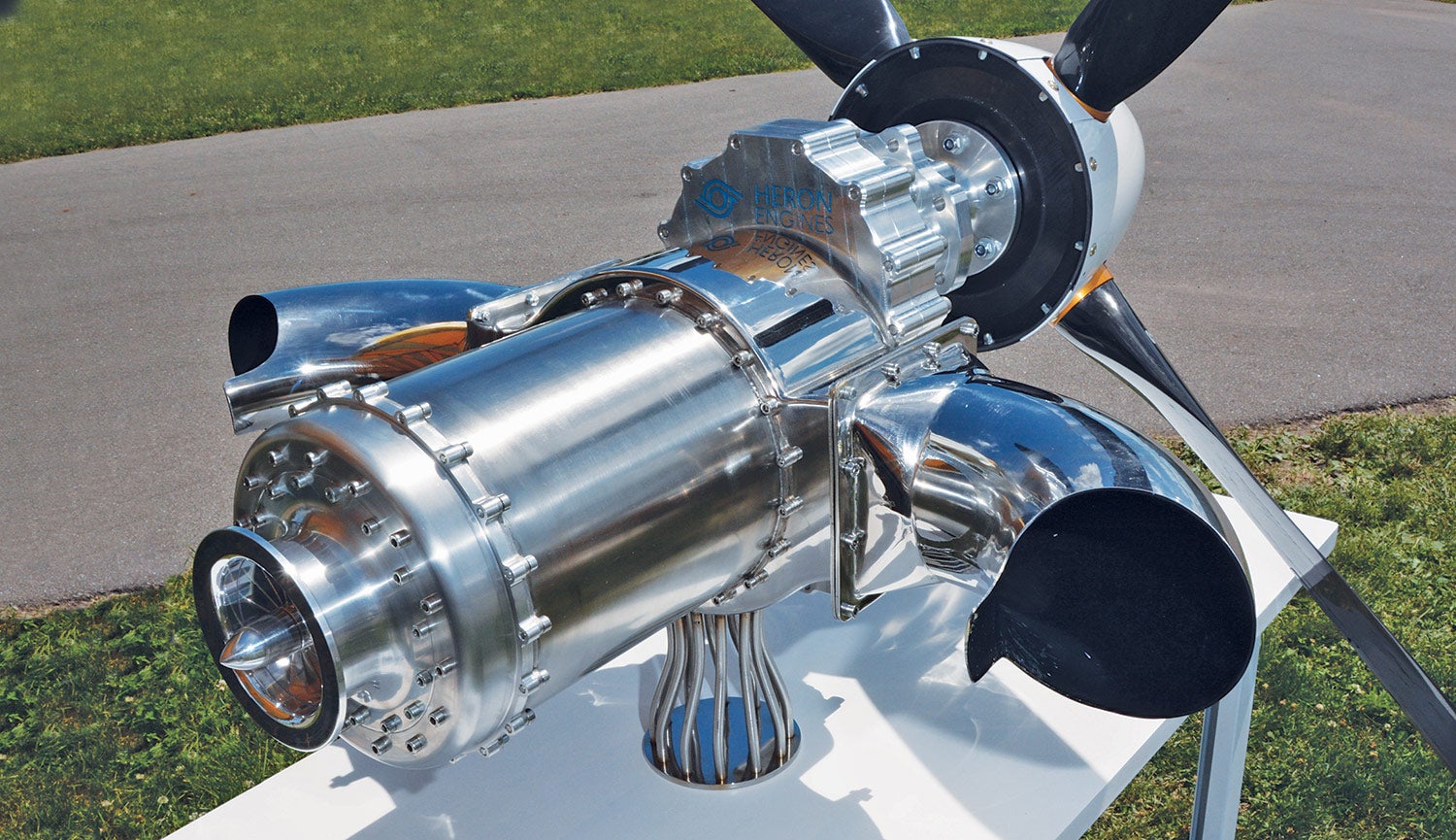PBS Aerospace
Even with all the interest in small turboprops, there is but one place to burn kerosene in the build-it-yourself world. The SubSonex single-seat jet is the one airframe readily available, and the Czech PBS TJ100 turbojet is the one engine that airframe is designed for. It’s the only jet engine in production with the thrust, size and availability to fit the sport aviation bill.
PBS does not disclose technical or pricing information without a non-disclosure agreement, so we’re unable to report directly on the little jet. SubSonex builders can order the PBS engine from Sonex, who lists the PBS engine on their website with full supporting hardware for $69,500. And if you have something spectacularly brief in mind, the TJ100 is now available in a higher output version with a 100-hour TBO. Bang!

Heron Engines
Heron, a Greek company keeping its corporate headquarters on the nearby, business-friendly island of Crete, is building on four decades of small turbine experience. That’s thanks to founding member Alex Vrontoulakis’ father designing and building target drone and UAV engines. Now partnered with Alex Fatseas in Heron since 2018, the two Alexes are dedicated to delivering a simple, easy to maintain and affordable turbine to the enthusiast market. Keeping a low profile until all major engineering and production challenges were met, at AirVenture 2022 they announced production will begin “by the end of 2022” and opened a preproduction order list.
Certainly the numbers surrounding the GVA-130 engine are getting attention. For starters the show price at AirVenture of $35,000 with accessories was much less than expected for a turbine, even a small one. Heron says to expect $42,000 as the normal retail price for ready to run engines; that is still approachable for any sort of personal aircraft engine and sets the bottom of the market for turbines.

Weighing only 82 pounds with gearbox, the GVA-130 is rated at 130 hp, carries a service ceiling of 28,000 feet, should go 3000 hours between $7000 overhauls and burns just about anything you pour in it (so they say), although Jet A is obviously preferred. Quoted fuel burn is 10.5 gph. Heron was working through certification and final detail testing, so the numbers might change slightly but you get the general idea.
Technically the GVA-130 is a free turbine with a single centrifugal-flow compressor and two axial-flow turbine stages. It does not use a recuperator as Heron judges those not worth the weight, cost or complexity at this end of the market. The gearbox features three gears, two in a planetary for the gear reduction and the third as a quick-change feature for rapidly configuring the core engine to different airframes, such as between fixed-wing and helicopter applications. Modularity is good.
Aero Affinity, a new company in Deland, Florida, has signed as Heron’s North American representative. They specialize in providing overseas companies turnkey access to the U.S. market and are handling sales and maintenance for Heron.
| Model | Drive Type | Horsepower | Weight | Price |
|---|---|---|---|---|
| PBS Velká Bíteš | ||||
| TJ100 turbojet | NA | Thrust – 247 lbf, 173 continuous | 43 lb w/ accessories | Not provided |
| Heron Engines | ||||
| GVA-130 turboprop | geared | 130 shp | 88 lb w/ accessories | $42,000 |














I enjoyed your informative article on the jet engines. My project scope is in the design of my new Air Turbine engine which was recently patented in Nove 2019 #10,480,343 to use the smaller jet engine concept. Using the thrust and the heat to heat the core and develop a shaft power capable of producing 300kws of electrical power. But what I have found out that amount of fuel usage can be reduced to 25 percent. Whie the bigger version which is now prototyped and running, (22″ dia.) does not run on combustion fuels but electric energy to heat the internal structure and to create a steam to drive this turbine. But my new 10 inch version is being built to use a smaller Model Jet engine to heat the internal core. One thing I have come to know is the mathematical formulas to prove a theory before actually building it. So the math numbers I get are very desirable. I should have a new prototype available for testing at the end of this year. Thank you for this article and information. If you want to know more contact me at my email kimazorzi@gmail.com or phone 979-885-9145 Sincerely P.S. i loved the article on the Sonex Jet engine model aircraft.